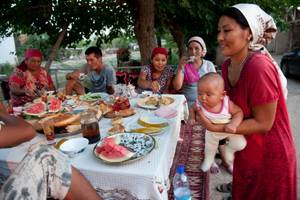
24 Nov, 2013
UN Launches International Year of Family Farming 2014
22 November 2013, New York (FAO press release) – The United Nations has launched the 2014 International Year of Family Farming to stress the vast potential family farmers have to eradicate hunger and preserve natural resources.

Family farming is the backbone of agriculture.
In both developed and developing countries, over 500 million family farms, defined as farms that rely primarily on family members for labour and management, produce the food that feeds billions of people. In many developing countries family farms represent up to 80 percent of all farm holdings.
The launch of the International Year in New York was attended by UN officials, ambassadors to the UN, government ministers and civil society leaders who will serve as special ambassadors for the year (names listed below).
FAO Director-General José Graziano da Silva stressed the huge productive potential of family farmers.
“By choosing to celebrate this year, we recognize that family farmers are leading figures in responding to the double urgency the world faces today: improving food security and preserving the natural resources, in line with the Millennium Development Goals, with the debate on the post-2015 development agenda and the Zero Hunger Challenge,” Graziano da Silva said.
Speaking on behalf of FAO, which is the lead UN agency for the year, the International Fund for Agricultural Development and the World Food Programme, he added: “Nothing comes closer to the sustainable food production paradigm than family farming. Family farmers usually run non-specialized, diversified agricultural activities that give them a central role in securing environmental sustainability and preserving biodiversity.”
He portrayed most family farmers, as well as fisher folk, pastoralists, indigenous people and traditional communities, as among the world’s most vulnerable populations, a situation that the year will try to address.
“We need to reposition family farming at the centre of national and regional development programmes,” he said. “Governments play a key role in leading the support so that family farming can reach its potential.
“This includes offering technical assistance and policies that support the productivity increase of family farms; placing appropriate technologies within their reach; improving their access to land and water, credit and markets; and creating an enabling environment for further investments,” he added.
He said that everyone had a role to play in fulfilling the potential of family farming, including family farmers associations and networks, international and regional agencies, the private sector, civil society and academia.
Special ambassadors for the year include Ibrahim Coulibaly, from Mali, President of the National Coordination of Peasant Organizations of Mali; Mirna Cunningham, from Nicaragua, former Chair of the UN Permanent Forum on Indigenous Issues; and Gerd Sonnleitner, from Germany, President of the European Farmers Association.
Overview of the year
Over 70 percent of the food insecure population lives in rural areas of Africa, Asia, Latin America and the Near East. They too are family farmers, especially smallholders, with poor access to natural resources, policies and technologies.
All kinds of evidence show that poor family farmers can quickly deploy their productivity potential when the appropriate policy environment is effectively put in place.
Family farmers are embedded in territorial networks and local cultures, and spend their incomes mostly within local and regional markets, generating many agricultural and non-agricultural jobs.
The International Year aims to raise the profile of family and smallholder farming by focusing world attention on its significant role in alleviating hunger and poverty, providing food security and nutrition, improving livelihoods, managing natural resources, protecting the environment, and achieving sustainable development, in particular in rural areas.
The year will promote broad discussion and cooperation at the national, regional and global levels to increase awareness and understanding of the challenges faced by smallholders and help identify efficient ways to support family farmers.
UN Secretary-General’s message for launch of International Year of Family Farming 2014
I am pleased to send greetings to the official launch of the International Year of Family Farming 2014. Empowering family farmers is central to the Zero Hunger Challenge, which seeks to eradicate extreme poverty and hunger and to promote equitable, sustainable food systems for food security and nutrition.
As populations grow, food demand is predicted to increase by 50 per cent by 2030. The International Year of Family Farming 2014 recognizes the important contribution that small- and medium-scale farmers, fishing communities and pastoralists can make in the post-2015 development agenda.
A principal requirement of sustainable food systems is resilience in the face of environmental and economic shocks. Climate change, in particular, is exacting a heavy toll on worldwide agricultural production and rural livelihoods. The projections are alarming: 49 million more people may be at risk of hunger by 2020; each one degree rise in temperature will cause a 25 per cent increase in food prices.
Smallholders everywhere face particular risks, since they rely on vulnerable ecosystems, and many lack the capacity to cope with more extreme weather events. Family famers must be empowered to adapt to climate change.
The International Year of Family Farming calls for commitments from every stakeholder. Governments can empower family farmers, especially women and youth, by creating policies conducive to equitable and sustainable rural development. Private investors can ensure accountability and social and environmental responsibility throughout the value chain from farm to fork. Too much food is lost after harvest because small-scale producers aren’t able to store, process and transport their goods. .
Agricultural research and extension agencies and the knowledge community can tailor appropriate technologies for family farmers, and family farmers’ organizations, cooperatives and civil society as a whole can strengthen their role in promoting dialogue on this important issue. Together, let us use this International Year to reposition family farming as a central tool for sustainable development.



Liked this article? Share it!